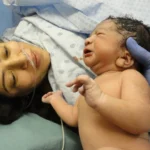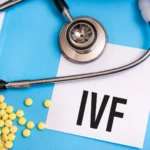The journey towards parenthood is filled with hopes and dreams, but for many couples in India and worldwide, conceiving a child doesn’t happen as easily as expected. Facing infertility can be an emotionally challenging and often isolating experience. However, it’s important to know that significant advancements in medical science over recent decades have brought immense hope. Today, a wide array of effective treatments are available, offering many couples a much greater chance of achieving their dream of having a family.
I’m Dr. Santosh Madrewar. At Borneo Hospital, with our comprehensive mother, child, and family healthcare centres in Thane and Nashik, supporting couples on their fertility journey is an integral part of our commitment. We understand the sensitive nature of infertility and strive to provide not only advanced medical care but also compassionate support. This article aims to provide a clear overview of the spectrum of Modern Treatments for Infertility, explaining the various options available, from initial lifestyle changes to sophisticated assisted reproductive technologies. It’s crucial to remember, though, that the best treatment path is always highly individualised, determined after a thorough evaluation to understand the specific cause or causes of infertility.
The Crucial First Step: Diagnosis
Before any treatment begins, understanding why conception is proving difficult is essential. A comprehensive fertility evaluation involving both partners is the necessary first step. Identifying the underlying factors – whether they relate to ovulation, sperm health, fallopian tubes, the uterus, or a combination of issues – allows us to recommend the most appropriate and potentially successful Modern Treatments for Infertility.
Starting Simple: Lifestyle Modifications
Sometimes, optimising overall health can positively impact fertility, either enabling natural conception or improving the success rates of other treatments. These changes are often recommended as a foundational step:
- Healthy Weight Management: Achieving and maintaining a healthy Body Mass Index (BMI) is important, as being significantly underweight or overweight can disrupt hormone balance and affect fertility in both men and women.
- Smoking Cessation: Smoking has detrimental effects on egg quality, sperm parameters, and pregnancy outcomes. Quitting completely is strongly advised for both partners.
- Alcohol Moderation/Avoidance: Excessive alcohol intake can impair fertility. Limiting or avoiding alcohol is recommended when trying to conceive.
- Stress Management: While everyday stress isn’t a direct cause of infertility, chronic high stress can interfere with reproductive hormones. Incorporating stress-reducing activities like yoga, meditation, or hobbies can be beneficial.
- Timing Intercourse: Understanding the woman’s fertile window (the days leading up to and including ovulation) and timing intercourse accordingly can increase the chances of natural conception.
Whilst beneficial, lifestyle changes alone may not be sufficient if significant underlying medical factors are present, but they form a good base for all fertility efforts.

Medical Treatments Primarily for Female Infertility
When ovulation is irregular or absent, medications can often help:
1. Ovulation Induction Medications:
- Purpose: These medications stimulate the ovaries to develop and release one or more mature eggs. They are commonly used for conditions like Polycystic Ovary Syndrome (PCOS) where ovulation is infrequent.
- Common Oral Medications: Clomiphene citrate (often known as Clomid) and Letrozole (Femara) are frequently used first-line treatments. They work by signalling the brain to produce more hormones (FSH and LH) that stimulate egg follicle growth in the ovaries.
- Injectable Hormones (Gonadotropins): If oral medications aren’t effective, or as part of IVF treatment, injectable hormones containing FSH, LH, or a combination (hMG) may be used. These directly stimulate the ovaries but require much closer monitoring due to a higher risk of multiple follicle development and potential side effects like Ovarian Hyperstimulation Syndrome (OHSS).
- Monitoring is Essential: Cycles using ovulation induction, especially injectables, require careful monitoring with transvaginal ultrasound scans and sometimes blood tests. This helps track follicle growth, determine the right time for intercourse or IUI, and adjust dosages to minimise the risk of high-order multiple pregnancies (triplets or more). Borneo Hospital provides this necessary close monitoring.
2. Treating Underlying Conditions:
- If infertility is related to other hormonal issues, specific treatments are used, such as medication to lower high prolactin levels (Cabergoline) or medication to manage thyroid disorders. For women with PCOS and insulin resistance, Metformin might be prescribed.
Surgical Interventions (For Specific Male & Female Factors)
In some cases, surgery can correct anatomical problems hindering fertility:
For Women:
- Laparoscopy / Hysteroscopy: These are minimally invasive procedures. Laparoscopy involves inserting a small camera through a tiny incision near the belly button to view the pelvic organs. It can diagnose and treat conditions like endometriosis (removing implants or cysts), remove scar tissue (adhesions), or sometimes even repair blocked fallopian tubes. Hysteroscopy involves inserting a thin camera through the cervix into the uterus to diagnose and remove issues inside the uterine cavity, like polyps or certain types of fibroids, that might interfere with embryo implantation. Borneo Hospital’s gynaecological team is experienced in these procedures.
For Men:
- Varicocele Repair: Surgery can be performed to tie off the swollen veins (varicocele) around the testicle. This may improve sperm count, motility, and morphology in some men, though benefits can vary.
- Obstruction Repair: Using microsurgery, experienced surgeons can sometimes repair blockages in the vas deferens or epididymis, for example, performing a vasectomy reversal or bypassing blockages caused by infection.
- Sperm Retrieval: Discussed further under ART, but surgical methods exist to retrieve sperm if blockages are present.
Medical Treatments Primarily for Male Infertility
Beyond surgery, some options exist:
- Hormone Therapy: Less common than in women, but if specific hormone deficiencies affecting sperm production are identified through testing, hormone treatments might be prescribed.
- Treating Infections: If an infection like epididymitis is found to be affecting sperm or causing blockage, appropriate antibiotic treatment is given.
- Managing Ejaculation/Erectile Issues: Medications (like Sildenafil for erectile dysfunction) or specific therapies can help overcome problems with sperm delivery during intercourse.
Assisted Reproductive Technology (ART): Advanced Solutions
ART refers to a group of sophisticated techniques used when simpler treatments are not suitable or have not been successful. These represent major advancements in modern treatments for infertility.
1. Intrauterine Insemination (IUI):
- What it is: A procedure where a prepared sperm sample (sperm are washed and concentrated in the lab to select the most motile ones) is placed directly into the woman’s uterus using a thin, flexible catheter around the time of ovulation.
- When Used: Often suitable for couples with mild male factor infertility (slightly low sperm count or motility), unexplained infertility, or issues with cervical mucus. It’s frequently combined with ovulation induction medications to increase the number of eggs available.
- The Process: Relatively simple and quick, usually performed in the clinic.
2. In Vitro Fertilisation (IVF):
- What it is: ‘In vitro’ means ‘in glass’. IVF involves retrieving eggs from the woman’s ovaries and fertilising them with sperm in a specialised laboratory. The resulting embryos are cultured for several days before one or two are transferred back into the woman’s uterus to hopefully implant and develop.
- When Used: IVF addresses many infertility causes, including blocked or damaged fallopian tubes, severe endometriosis, ovulation disorders not responding to simpler treatments, moderate to severe male factor infertility (often with ICSI), unexplained infertility after other treatments fail, diminished ovarian reserve, or when genetic testing of embryos (PGT) is needed.
- Key IVF Steps (Simplified):
- Ovarian Stimulation: Controlled use of injectable hormones to stimulate the ovaries to produce multiple mature eggs (instead of the usual one). Progress is monitored closely with scans and blood tests.
- Egg Retrieval: A minor surgical procedure, usually done under light sedation or anaesthesia. A needle guided by ultrasound is used to collect the eggs from the ovarian follicles.
- Fertilisation: In the lab, the collected eggs are either mixed with prepared sperm (conventional IVF) or each egg is injected with a single sperm (ICSI – see below).
- Embryo Culture: The fertilised eggs (now embryos) are grown in special incubators for 3 to 5 (sometimes 6) days, allowing embryologists to monitor their development.
- Embryo Transfer: The best-quality embryo(s) are selected and carefully transferred into the woman’s uterus using a thin catheter. This procedure itself is usually quick and painless.
- Borneo Hospital offers a comprehensive IVF programme with a state-of-the-art laboratory and experienced clinical and embryology teams.
3. Intracytoplasmic Sperm Injection (ICSI):
- What it is: A specialised technique used alongside IVF. Instead of just mixing sperm and eggs, an embryologist uses a powerful microscope and micro-tools to select a single sperm and inject it directly into the cytoplasm (centre) of each mature egg.
- When Used: Primarily indicated when there is a significant male factor infertility issue (very low sperm count, poor movement, or abnormal shape), if sperm have been surgically retrieved (from the testes or epididymis), or sometimes if previous IVF cycles resulted in poor or no fertilisation. ICSI service is available at Borneo.
4. Other Advanced ART Options (Brief Mention):
- Donor Gametes: Using donated eggs or sperm is an option when a couple cannot use their own due to factors like premature ovarian insufficiency, severe male infertility, genetic concerns, or for same-sex couples.
- Gestational Surrogacy: An arrangement where an embryo created from the intended parents (or donors) is transferred into the uterus of a surrogate (gestational carrier) who carries the pregnancy. The legal framework surrounding surrogacy in India is specific and requires careful consideration and legal counsel.
- Preimplantation Genetic Testing (PGT): Embryos created via IVF can be tested for specific genetic disorders or chromosomal abnormalities before being transferred to the uterus. This is used in specific situations, often related to known genetic risks or recurrent pregnancy loss.
- Frozen Embryo Transfer (FET): Often, good quality embryos remaining after a fresh IVF transfer can be frozen (vitrified) for future use. FET involves thawing these embryos and transferring them into the uterus in a subsequent cycle.
Choosing the Right Treatment Pathway
With so many options, how do you choose?
- Stepwise Approach: Generally, treatment proceeds logically. Lifestyle changes may be advised first, followed by simpler medical or surgical interventions if needed. ART is usually considered if simpler methods are inappropriate or unsuccessful.
- Personalised Decision: The ‘best’ treatment depends entirely on the diagnosed cause(s) of infertility, the woman’s age (a very key important factor), how long the couple has been trying, results of previous treatments, financial considerations, and personal preferences.
- Expert Guidance: This decision is made in close consultation with your fertility specialist. At Borneo Hospital, our team will discuss all suitable modern treatments for infertility, explain the process, potential success rates, and risks involved, helping you make an informed choice together.

Success Rates & Emotional Considerations
It’s important to approach fertility treatment with realistic optimism.
- Variability: Success rates for modern treatments for infertility vary widely based on the specific treatment, the underlying cause of infertility, and crucially, the woman’s age. Your specialist can give you personalised success rate estimates. Remember that ART often require more than one cycle to achieve pregnancy.
- The Emotional Journey: Undergoing investigations and treatments for infertility can be an emotional rollercoaster. It requires time, commitment, financial resources, and can place stress on relationships. Seeking emotional support – from your partner, family, friends, or professional counsellors – is incredibly important throughout this process.
The field of reproductive medicine has made incredible strides, and today, the range of Modern Treatments for Infertility offers genuine hope to countless couples facing difficulties conceiving. From lifestyle adjustments and medications to advanced surgical techniques and sophisticated ART procedures like IVF and ICSI, effective options exist for many different causes of infertility.
The journey starts with a thorough evaluation to understand the specific challenges you face. Based on this diagnosis, a personalised treatment plan can be developed in partnership with experienced fertility specialists. It’s crucial to seek expert care, ask questions, understand your options fully, and manage expectations realistically.
At Borneo Hospital, we are dedicated to providing comprehensive, compassionate, and cutting-edge fertility care. Our experienced team utilizes advanced technologies within a supportive environment, walking alongside you on your path towards parenthood. If you are struggling to conceive, please know that help is available.
















